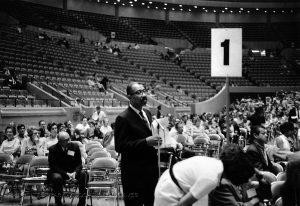This month saw the passing of Satia Marshall Orange, former director of what is now ALA’s Office for Diversity, Literacy and Outreach Services (ODLOS). I had the good fortune to meet Orange early in my career, back in 2015, when she donated her father’s papers to the University of Illinois Archives. The then Assistant University Archivist, Chris Prom, planned to make the trip up to Chicago to see Orange and review her father’s papers. I asked to tag along as the ALA Archivist after hearing that Orange was a retired ALA staff member and that her late father was a librarian. She welcomed both of us into her home and was delighted to look through her father’s papers with us, share family stories, and was eager to preserve the legacy of her family.

Her father, Albert P. Marshall, was an alum of Lincoln University and the University of Illinois at Urbana-Champaign and spent his distinguished career as a director of libraries at Lincoln University and Eastern Michigan University. He was an active member of ALA, the Black Caucus of the American Library Association, a founder of the North Carolina Negro Library Association, and the first Black president of the Missouri Library Association. Marshall once described himself and E. J. Josey as “‘the bad boys of the Association’ for continually insisting in the 1950s and 1960s that segregated state affiliates were indeed a library issue.”[1] Marshall fought to make ALA a more inclusive association and served as a member of Council from 1963 to 1976, as chair of the 1965-1966 Nominating Committee, and as second vice president in 1971-1972, among numerous other committee and leadership positions.[2]

Orange’s mother, Ruthe Langley Marshall, was also a librarian. Langley Marshall started her library career while in her 50s, receiving her Master of Library Science from the University of Michigan in 1971. She served as the director of the Washtenaw County Library for the Blind and Physically Handicapped in Ann Arbor, Michigan, from 1972 until her retirement in 1979.[3] The program was the first of its kind in Michigan and was a pilot program when Langley Marshall agreed to coordinate it in 1972. Two years later there were five such programs within the state. Of her library work with physically disabled and blind patrons, Langley Marshall noted, “There is a warmer relationship. We feel that we known them and they can tell us what they want.”[4]
With such parents, it is little wonder that Orange entered librarianship herself. Orange recalled her mother telling her that “when I accompanied my parents to the 1955 Annual Conference in Philadelphia, I would be sleeping while in another part of the room, librarians would be strategizing upcoming actions before ALA Council or the Executive Board.”[5] Despite her early exposure to the field, Orange joked that, “I was pulled into the profession kicking and screaming.”[6] Her father confirmed that sentiment in an oral history, saying, “At first she just wouldn’t have it, she didn’t want to be a librarian.”[7] Orange started her career in special education until she was recruited by Virginia Lacy Jones to the Atlanta University’s School of Library Sciences.[8]
In 1997, Orange served as the director of ALA’s Office for Literacy and Outreach Services (OLOS) until her retirement in 2009. As director of OLOS, Orange was an advocate for traditionally underserved populations within librarianship and the communities the profession served. Her father was proud of Orange’s position, saying, “There’s a lot of satisfaction in that for me.”[9]

And his pride was well placed as Orange proved to be a strong leader within ALA, broadening the Association’s support for underrepresented communities and serving as staff liaison to the Ethnic and Multicultural Information Exchange Round Table (EMIERT), the Gay, Lesbian, Bisexual and Transgender Round Table (now Rainbow Round Table) and the Social Responsibilities Round Table (SRRT). Orange was also the driving force behind the Dr. Martin Luther King, Jr. Sunrise Celebration.[10] Her work was later honored by EMIERT’s Distinguished Librarian Award in 2017 and again in 2022 by ALA with an endowment in her honor for the benefit of the ALA Spectrum Scholarship.
This only scratches the surface of the accomplishments and impact of the Marshall Orange family. When Orange gave us her father’s papers for the University Archives back in 2015, she was entrusting us with her parents’ legacy. The Albert P. Marshall Papers are processed and available for research at the University Archives. Her own hard work is documented within the ALA Archives through the records of ODLOS, also open for research.
The Albert P. Marshall Papers: https://archon.library.illinois.edu/archives/index.php?p=collections/controlcard&id=3139
Finding aids for ODLOS: https://archon.library.illinois.edu/ala/index.php?p=collections/classifications&id=3350
Sources:
[1] Beverly Goldberg, “African Americans ‘Stretch the Envelope’ at the First Black Caucus Conference,” American Libraries 23, no. 10 (November 1992): 834.
[2] “Obituaries,” American Libraries 32, no. 5, (May 2001): 84.
[3] “Library serving blind, handicapped plans event,” The Ann Arbor News, October 10, 1979. https://aadl.org/aa_news_19971010-library_serving_blind
[4] Aretha Jackson, “Librarian’s Books ‘Speak’ to Handicapped Persons,” The Ann Arbor News, September 29, 1974, pg. 5. https://aadl.org/aa_news_19740929-librarians_books_pg5
[5] Satia Marshall Orange, “Insistence Toward Equity,” American Libraries 49, no. 11/12 (November/December 2018): 7.
[6] Greg Landgraf, “Blazing Trails: Pioneering African-American librarians share their stories,” American Libraries 49, no. 1-2 (January/February 2018): 39.
[7] Laurence Smith, “Dr. Albert P. Marshall, Oral History Interview, 1998,” Oral Histories, Eastern Michigan University (1998): https://commons.emich.edu/oral_histories/7
[8] “New ALA Endowment honoring Satia Marshall Orange to benefit Spectrum Scholarship Program,” American Library Association (April 17, 2022): https://www.ala.org/news/2022/04/new-ala-endowment-honoring-satia-marshall-orange-benefit-spectrum-scholarship-program. Accessed 5/24/2024.
[9] Tony Dearing, “Librarian’s efforts pierced barriers to integration,” The Ann Arbor News, February 23, 1997. https://aadl.org/aa_news_19970223-librarians_efforts_pierced_barriers_to_integration
[10] “New ALA Endowment honoring Satia Marshall Orange to benefit Spectrum Scholarship Program.”